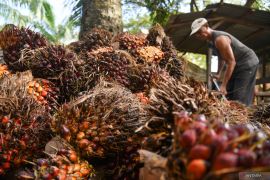Emission reductions are expected to continue to improve from 2021 to 2040, based on the road map that we have createdJakarta (ANTARA) - The use of biofuels will reduce carbon emissions by 39.7 million tons of carbon dioxide (CO2) equivalent by 2040, the Energy and Mineral Resources Ministry has estimated.
"Emission reductions are expected to continue to improve from 2021 to 2040, based on the road map that we have created. Thus, our environment will be cleaner and healthier, encouraging net zero emission (NZE)," sub-coordinator of biofuel supervision at the Bioenergy Directorate of the Energy and Mineral Resources Ministry, Herbert Hasudungan, said at a webinar on 'Food vs Energy: Reviewing Biofuel Policy in Indonesia', which was accessed from here on Tuesday.
In 2021, with the use of Biodiesel B30 reaching around 9.2 million kiloliters, Indonesia reduced emissions by 24.4 million tons of CO2 equivalent, he informed. The figure reflected an increase compared to 2017, when emission reductions were recorded at just 6.83 million tons of CO2 equivalent, he said.
"Next year, the use of biodiesel B30 is planned to increase, in accordance with the economic growth target of 5 percent, so that it increases to 10 million kiloliters for biodiesel," he added.
The government will start using bioavtur in 2022, in addition to biodiesel, Hasudungan said.
The use of bioavtur, which is estimated to reach 142 kiloliters in 2022, could reduce emissions by up to 368 thousand tons of CO2 equivalent, he added.
The use of 9.2 million tons of biodiesel in 2021 will also increase employment in this sector by creating jobs for up to 1.15 million people, he disclosed.
To boost the use of biodiesel, the government is currently preparing indicators of biodiesel sustainability, particularly those made from a mixture of crude palm oil (CPO), he informed. These indicators will cover three aspects—environmental, social, and economic, he added.
"We are still discussing to gain the best indicators. From the environmental point of view, there are criteria related to emissions, risk management, and capability management, then from the social point of view, it is explored how income and labor increase with the use of biodiesel, as well as from the economic point of view, it is discussing about productivity and added value of biodiesel," Hasudungan said.
Related news: Indonesia ready for decarbonization measures in marine activities
Related news: Government should design framework for biofuel to lower emissions: NGO
Related news: President reiterates commitment to leave fossil energy
Translator: Sanya D S, Mecca Yumna
Editor: Sri Haryati
Copyright © ANTARA 2021












